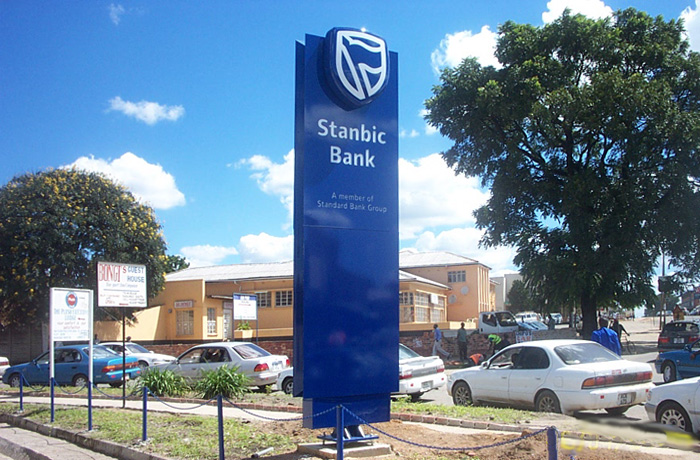STANBIC BANK – PROFESSIONAL CREDIBILITY QUESTIONED!
Notice: Undefined index: catFilterList in /home/zambi/public_html/wp-content/plugins/wp-likes/api.php on line 243

Stanbic
BY DERRICK SINJELA
In my earlier articles I alluded to the fact that Stanbic Bank has a history of unprofessional conduct in Tanzania ranging from bribery to fraud and elsewhere on the African Continent other such corporate shenanigans are prevalent. I alluded further to the fact that within the region vis a vis SADC and COMESA region, the journalists in this region have taken a keen interest in the goings on at Stanbic Bank Zambia. Now as usual some quarters of my critics had their doubts about this assertion.
Here is an email from www.pressreader.com who writes as follows;
Dear Editor, Today, I was just trying to digest the impact that the alleged Zambian government’s ban on the importation of fruits and vegetables will have on the foreign – owned supermarkets chains and local suppliers. One indisputable fact is that most of these supermarkets chains are South African-owned and therefore, prefer empowering their fellow South Africans by importing fruit to the detriment of Zambian suppliers.
Because of this “Buy South African” attitudes, many local companies have been muscled out of the market or certain manoeuvres have been employed to ensure that local competition is killed. Such methods may include lending institutions acting in a manner that paints some of their clients in bad light to create more business for their partners.
Such methods may include lending institutions acting in a manner that paints some of their clients in bad light to create more business for their partners.
It was while digesting the fruit and vegetable alleged ban that my eyes came across a seven-month old article in the Financial Mail detailing how Lusaka High Court Judge Justin Chashi had ordered that Stanbic Bank Zambia pay K192.5 million in damages to Savenda Management Services for “carelessly” listing the company on the Credit Reference Bureau (CRB), thereby leading to as significant loss of contracts. My interest in the matter was re-awakened not so much because of the amount of money involved as the manner in which Stanbic acted, in flagrant breach of client confidentiality when it reported Savenda to CRB for defaulting on instalments involving a US$540,000 loan facility obtained in 2007. There are many Zambian-headed companies and individuals who may have suffered in similar manner as Savenda Management Services at the hands of Stanbic Bank Zambia or indeed other banks whose motive is not really about helping the local business enterprises thrive.

Stanbic Bank Zambia bill board
Herein, therefore, lies the public interest. It is even a wonder that Stanbic Bank has found it convenient to appeal the matter despite it having acknowledged in a letter to Savenda that the non-payments had been a result of an internal suspense account and that the “anomaly” had been rectified. The question that begs an answer here is: Why did Stanbic Bank rush to reporting the apparent default before adequately investigating the matter within its internal systems? How many other local companies have ended up losing business because of an overzealous bank negligently reporting a client to CRB, resulting in a negative credit agency listing? In the case of Savenda, the negative listing resulting in the global supply management company losing several fading opportunities and harm to its reputation.
In Judge Chashi’s words, Stanbic Bank was found to have been “culpably careless” in reporting its client without properly investigating the matter, hence his ruling that the bank pay K192.5m in relief and legal costs. One other interesting aspect that this matter brings back to light is the Banking and Financial Services Act which provides that banks maintain customer confidentiality unless a court order is obtained or client’s consent is sought.
How many Zambian’s are aware of this? The Savenda case is a lesson to all of us. By the way, Stanbic Bank was even granted leave to appeal out of time! How special is the bank? Wasn’t the presidential petition in Zambia’s election last August thrown out on grounds that the 14 days during which to hear it had elapsed?
Does Zambia have two justice delivery systems? Looking at what Stanbic did in Tanzania, which is public knowledge, and how they were fined large sums of money, one remains to wonder whether the banks’ unprofessional conduct has not spread to their branches in Zambia.
It is high time Zambians stood for each other to fight this unbecoming behaviour of banks such as Stanbic as the citizens of this country have been condemned time and time again for allegedly being bad payers of loans without realising that banks have their own motives and arrogance.
Judge Chashi should be congratulated by well-meaning Zambians for the landmark ruling which has made other investors to respect the Zambia court systems, as they now know that when faced with unfair treatment, they turn to the Judiciary for Justice. So we need to be wary of the behaviour of banks that only bolster the business prospects of South African companies, such as the South African-owned supermarkets dotted all over our country’s shopping malls. It is even surprising that seven months after Judge Chashi’s ruling, stakeholders in the banking and business sectors have remained mute. What is so special with Stanbic Bank? Who is conniving with who? I leave the judgement to you fellow Zambians.






















